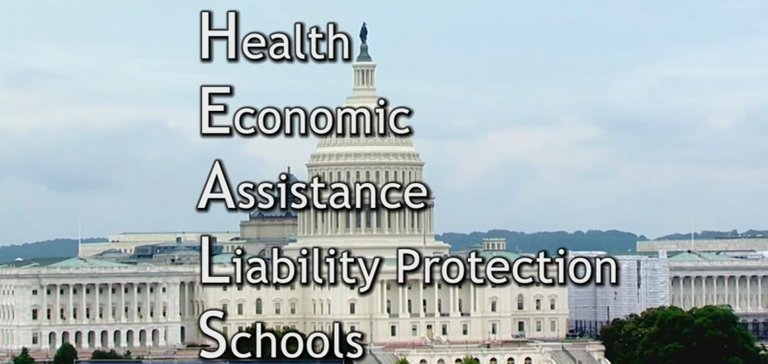
On July 25th, 2020, many of the monetary previsions for companies and individual Americans established in the Cares Act (which passed in March of the same year) expired. This has left many Americans on the edge of their seats as they wait to find out what will happen to their jobs, their unemployment benefits, and most importantly, their lives. Which brings us to a new bill introduced to the senate for voting on August 7th, also known as the HEALS Act.
What is the HEALS Act?
Let’s start by discussing what the HEALS act does cover in comparison to its predecessor the CARES Act. Just as in April of this year, the HEALS Act has a provision for one-time stimulus checks to be paid directly to the consumer. And the stipulations for this will be just as before, so if you got a stimulus check in April, you can expect another one if the Heals Act passes.
Increased unemployment benefits would also continue under the HEALS Act but to a much different extent. Rather than the extra $600 a week given across the board to anyone who qualified for unemployment under the CARES Act, that amount would be drastically reduced to only $200 a week. And not only that, but the $200 a week would be set to expire on October 5th, 2020. Once the expiration date passes, those on unemployment would be set to receive 70% of their original wages (unemployment usually funds covers 60% or less) but this mean people will no longer be making more on unemployment and will encourage workers to return to the field.
The HEALS Act also procures funding for state programs such as TANF (Temporary Assistance for Needy Families). This would help needy families find jobs, childcare, and housing if they qualify. This monetary assistance is capped at 2 billion nationwide.
Not only that, but thanks to insistence from Donald Trump, this new bill also has provisions for employers-offering them payroll tax credits and deferrals for retaining employees. There would also be a bonus for companies hiring those who are consistently considered unemployable (such as those receiving TANF benefits or long-term unemployment). And the deals for employers don’t stop there, the HEALS Act also contains funds to help cover the cost of PPE, COVID-19 Testing, and other health related expenses that have been costing work places money. In fact, if passed, the government will allow companies to deduct up to half of their health and sanitary costs from taxes, quite the break for companies.
What It Doesn’t Include
Seems kind of short right? And it is, the HEALS Act is much shorter than the previously proposed HEROES Act which was shot down by the Senate in May. But this is by design. The HEROES Act was deemed to expensive by the Senate and thus was not passed. Not only did it contain all of the items included in the current HEALS Act, but it also contained numerous other sorts of assistance which the Senate decided was too expensive. One of these was an additional hazard pay for workers on the front line of the COVID outbreak. And while this may seem like a good idea to include, it’s important to remember than many of these front-line workers are doctors and nurses—some of the highest paid jobs out there with lots of available overtime. Seems kind of weird to be giving these people a massive hourly bonus, and the Senate agreed, which is why this stipulation is missing from the HEALS Act.
Not only that, but the HEROES Act also had a provision for extending student loan forgiveness. Under the current CARES Act, anyone with student loans doesn’t have to pay any interest until September 2020. And if they miss a payment, they aren’t penalized. Now there’s still a chance this could be extended under the HEALS Act, but in its current form, there is no provision for student loan debt.
The HEROES Act also provided both rental and mortgage relief to families based on an established inability to pay. While this is missing from the HEALS Act, there is still the funds for TANF, which will still encompass some of these individuals and keep families from losing their homes if they qualify.
And it doesn’t end there (after all this bill was originally to cost $3 trillion) the HEROES Act also planned to provide money to the United States Postal Service which is about to go bankrupt later this year. Looks like we will have to keep sitting on the edge of our seats to see if you are still able to ship things via the government service come this Christmas season.
Why Leave So Much Out?
You’re probably sitting there wondering why the government couldn’t just pass the $3 Trillion-dollar version of the HEROES Act (HEALS is slated to cost only $1 trillion in comparison) because after all the government is just printing the money right?
They are. And that’s the problem. While it may seem cool to print $3 trillion now, it will only cause long term problems in the future. Even by just printing the $1 trillion the government has already promised the USA massive inflation in the next 12-18 months. And there’s some places where this inflation can already be seen. In response to COVID, many restaurants and retailers have raised their prices to cover the cost of increased sanitization as well as a decreased number of customers allowed in their building at a time. And it doesn’t stop there, many electronic companies found themselves sold out on consoles and games during the quarantine. And surprise, surprise, when the shelves were restocked, the prices were much higher. And supply chains across the nation have been disrupted, affecting the supply of different foods, paper goods, and even the supply of monetary coins.
What Should I Do?
Now, more than ever, is the time to invest your money. This won’t necessarily help you beat inflation, but it will hopefully help your money keep up with it as the value of the US dollar decreases when the full impact of these stimulus bills hit. Everyone’s situation is different, so it’s important to look into the type of investing that is right for you. There are low risk options like index funds, or higher risk options such as cryptocurrencies. Either way, it’s important to discuss your options with someone before you make any important financial decisions. If you are interested in learning more about cryptocurrency investments, check out MintDice.com which offers a number of free guides for new investors.
Overall, there’s nothing anyone can do on a personal level to stop the massive amount of inflation that’s on its way down thanks to government stimulus bills, so the best thing you can do it try to prepare your money to at least keep up with it.
Article brought to you by the MintDice Bitcoin Slots game. Originally posted on MintDice.


Are you happy with this new plan proposed by the US Government? Let us know!